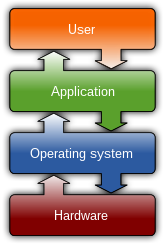 Global Information
Global InformationMemory management information
This article includes a list of general references, but it lacks sufficient corresponding inline citations. (April 2014) |
| Operating systems |
|---|
 |
| Common features |
|
Memory management is a form of resource management applied to computer memory. The essential requirement of memory management is to provide ways to dynamically allocate portions of memory to programs at their request, and free it for reuse when no longer needed. This is critical to any advanced computer system where more than a single process might be underway at any time.[1]
Several methods have been devised that increase the effectiveness of memory management. Virtual memory systems separate the memory addresses used by a process from actual physical addresses, allowing separation of processes and increasing the size of the virtual address space beyond the available amount of RAM using paging or swapping to secondary storage. The quality of the virtual memory manager can have an extensive effect on overall system performance. The system allows a computer to appear as if it may have more memory available than physically present, thereby allowing multiple processes to share it.
In some operating systems, e.g. OS/360 and successors,[2] memory is managed by the operating system.[note 1] In other operating systems, e.g. Unix-like operating systems, memory is managed at the application level.
Memory management within an address space is generally categorized as either manual memory management or automatic memory management.
- ^ Cite error: The named reference
:0was invoked but never defined (see the help page). - ^ "Main Storage Allocation" (PDF). IBM Operating System/360 Concepts and Facilities (PDF). IBM Systems Reference Library (First ed.). IBM Corporation. 1965. p. 74. Retrieved Apr 3, 2019.
Cite error: There are <ref group=note> tags on this page, but the references will not show without a {{reflist|group=note}} template (see the help page).